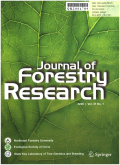- 钛学术文献服务平台 \
- 学术期刊 \
- 农业科学期刊 \
- 林业期刊 \
- 林业研究(英文版)期刊 \
Characterizing conservative and protective needs of the aridland forests of Sudan
Characterizing conservative and protective needs of the aridland forests of Sudan
基本信息来源于合作网站,原文需代理用户跳转至来源网站获取
摘要:
Forests in the aridlands of Sudan are distinctive in nature and require special attention due to the great role they play as a first and last line of defense against south-ward desertification.Thus,to determine their conservative and protective needs based on current conditions in the Wad Al-Bashir Forest(WF),toward ensuring sustainable forest resources in these areas,we used a systematic field survey,existing and available documents review and key informant interviews(KII),to collect data from 08 December 2017 to 15 May 2018.A severe depletion and changes in the forest tree cover and composition were found during the field sur-vey,where species such as Balanitis aegyptiaca is threatened and invasive species(e.g.,Acacia nubica)have started to dominate.Reviewed documents have credited illegal cut-ting and agricultural activities for the changes in the for-est status,whereas the KII indicated that past and current forest conservative and protective practices(CPPs),where forest clearance for agricultural,grazing,pests and disease control,were not given a deserved consideration as they relate to tree cutting and reforestation practices.Likewise,negligence of the needs of those who depend on the forest and inadequate funds have constrained implementation of some CPPs.Accordingly,on the basis of the results of this study,we recommend that CPPs associated with agriculture,grazing,forest fire,pest and disease control should be a top priority concern of forest authorities.Better financial sup-port,which could be enriched by involving governmental and non-governmental organizations,is also needed to boost CPPs in the WF.Invasive species also need to be cleared and replaced by trees such as A.senegal and B.aegyptiaca that are of economic and environmental value.

推荐文章
Ecological stoichiometry of nitrogen, phosphorous, and sulfur in China's forests
Forest
Stoichiometry
Nitrogen
Phosphorous
Sulfur
China
Spatial analysis of carbon storage density of mid-subtropical forests using geostatistics: a case st
Carbon storage density
Geostatistics
Mid-subtropical forests
Spatial autocorrelation
Spatial heterogeneity
苏丹红Ⅰ对大鼠CYP1A1、CYP2E1和CYP3A1基因表达及ALT和AST活性的影响
苏丹红Ⅰ
CYP1A1
CYP2E1
CYP3A1
ALT
AST
变周期采样控制系统的稳定性分析
采样控制系统
稳定性
变周期性
类Lyapunov泛函
内容分析
关键词云
关键词热度
相关文献总数
(/次)
(/年)
引文网络
引文网络
二级参考文献 (0)
共引文献 (0)
参考文献 (0)
节点文献
引证文献 (0)
同被引文献 (0)
二级引证文献 (0)
2021(0)
- 参考文献(0)
- 二级参考文献(0)
- 引证文献(0)
- 二级引证文献(0)
引文网络交叉学科
相关学者/机构
期刊影响力
林业研究(英文版)
主办单位:
东北林业大学
中国生态学学会
出版周期:
双月刊
ISSN:
1007-662X
CN:
23-1409/S
开本:
大16开
出版地:
哈尔滨市动力区和兴路26号(林大123信箱)
邮发代号:
创刊时间:
1990
语种:
eng
出版文献量(篇)
2459
总下载数(次)
1
总被引数(次)
7852
期刊文献
相关文献
推荐文献
- 期刊分类
- 期刊(年)
- 期刊(期)
- 期刊推荐
林业研究(英文版)2022
林业研究(英文版)2021
林业研究(英文版)2020
林业研究(英文版)2019
林业研究(英文版)2018
林业研究(英文版)2017
林业研究(英文版)2016
林业研究(英文版)2015
林业研究(英文版)2014
林业研究(英文版)2013
林业研究(英文版)2012
林业研究(英文版)2011
林业研究(英文版)2010
林业研究(英文版)2009
林业研究(英文版)2008
林业研究(英文版)2007
林业研究(英文版)2006
林业研究(英文版)2005
林业研究(英文版)2004
林业研究(英文版)2003
林业研究(英文版)2002
林业研究(英文版)2001
林业研究(英文版)2000
林业研究(英文版)1999

 免费查重
免费查重










